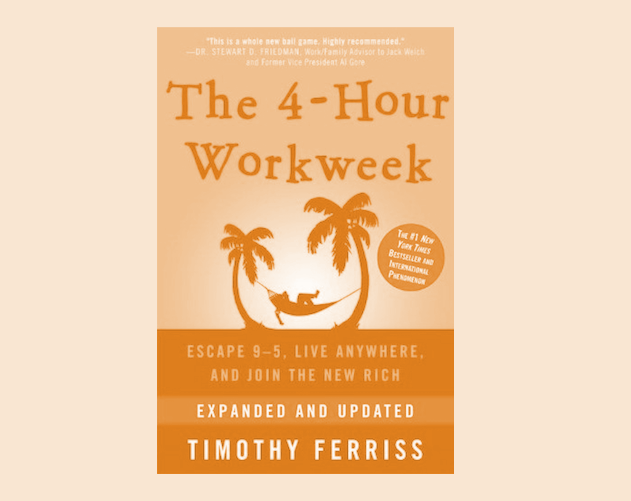The 4-hour week or how to learn about nomadic and digital capitalism
Tim Ferris has made an indisputable name for himself as a non-fiction author. He may have drawn on previous work to write the book we’re interested in today, but he has done the best job of propagating the ideas in his book. It is to him that we owe the democratization of the term digital nomad, the popularization of the concept of dropshipping and more broadly the application of Pareto’s law to all aspects of life.
This book aims to turn you into a “nouveau riche”, not in the pejorative sense of the term, even if you have every right to be a parvenu. It will provide you with advice that will allow you to create your own system for personal enrichment that will be synonymous with freedom and hedonism. The 4-Hour Workweek was formidable when it came out in breaking down the preconceptions most people have about the idea of retirement, the relationship to work or even the idea of wealth. In societies where work is an important identity marker, the 4-hour work week can make people cringe because this book is there to make you work less.
Let’s take a look at the book’s key concepts. Note that most of the concepts in this book are now mainstream. The 4-hour work week has helped popularize ideas that in 2007, when it was released, were anything but mainstream.
Absolute wealth vs. relative wealth
Your wealth is not what you earn, but what you have left in your bank account at the end of the month. Just as a business is judged on its ability to make a profit, a person should be judged primarily on their ability to save. Beyond the money you have left over each month, you also need to put it in perspective of what you can buy with it. It is not the same to save 1000€ in Rome as to save 1000€ in Bali. You have to optimize your relative wealth, that is to say finally see what kind of life you have, what products and services you can afford. Hence the need for Tim Ferris to create an online business. This will give you the opportunity to lower your monthly expenses if you decide to move to a country where life is cheaper. So you need to look for a better earning/expense ratio and choose a country that you like for what it can offer you.
You are also rich in your time
Being rich is a concept that often doesn’t take into account the time you spend working. Tim Ferris reminds us of the need to put your income in perspective with the free time you have. Being free is not just about having lots of money, it’s about having time to enjoy life. What’s the point of piling up fortunes if you can’t use them? The 4-hour work week invites us to progressively put in place systems to reduce our work time and thus increase our hourly income.
Mini-retirement
Retirement does not have to start at age 65. The 4-hour work week invites us to take advantage of the vitality and mobility that our youth offers. There is nothing more frustrating than retiring at an older age and not having the ability to enjoy it due to lack of energy or health reasons. The longer you wait, the fewer options you will have. Are you really thinking of trying bungee jumping at age 70? Mini-retirements are there to give you unique experiences while giving your brain the opportunity to learn valuable lessons that will help you improve personally and professionally.
Digital nomadism
This is a lifestyle that has become even more popular after the covid-19 pandemic even though air travel has been limited. Digital nomadism involves either developing monetizable skills online (computer development, graphic design etc.) or creating a business that you can operate remotely. In the second case, Tim Ferris encourages us to set up an e-commerce site operated as dropshipping. At the time of the book’s release, this was a truly innovative concept. On the other hand, today, it is much more difficult to stand out from the crowd by selling dropshipped products because of the saturation of the market in many niches.
Focus on the actions where you have the most added value
The more you grow, the more you will have the opportunity to delegate some tasks. The book recommends using virtual assistants that will allow you to handle tasks where your added value is limited such as answering emails or doing after-sales service.
Automate
Once you have created your business, try to automate as many tasks as possible so that you don’t have to deal with them. Your time is valuable, so use it wisely.
The 4-hour week is a catchy title
The idea is not to work 4 hours but it is an extreme case that is quite possible if you put into practice the book’s recommendations.
Minimalism: value your experiences rather than your possessions
What you will remember on your deathbed will be the experiences you had and not the objects you acquired. Don’t make the mistake of accumulating possessions and risk missing out on your life. Stick to the minimum, be a minimalist. This will free up your mental space, clean up your accounts and make it easier for you to go on a trip or leave everything behind to live on the other side of the world.
Work smart instead of hard
Limit your work time so that you have no choice but to work smart. Work efficiency follows a Gaussian curve: there is a threshold after which the return on your efforts decreases over time.
A 4-hour week to do something other than consume information
Free your mind from toxic information. To do this, there is nothing more effective than to stop reading the press or watching the news. If something serious or important happens, you will be quickly informed anyway.
Avoid interruptions
Interruptions undermine your productivity.
Make yourself unreachable. To do this, make sure your business can function without anyone needing to contact you.





